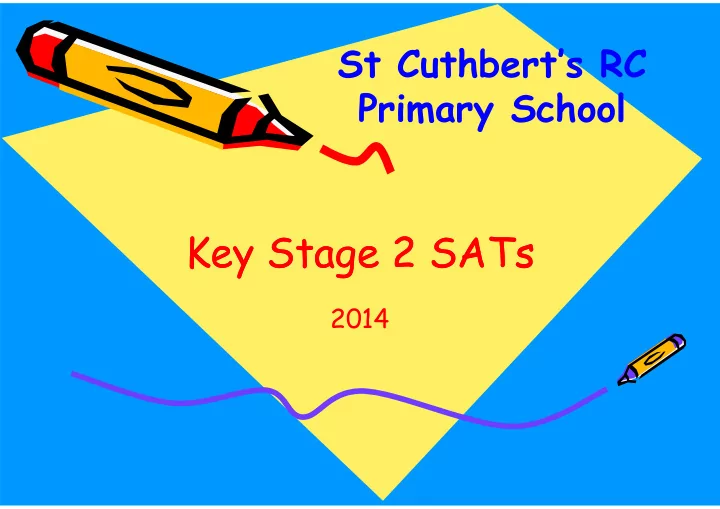

St Cuthbert’s RC Primary School Key Stage 2 SATs Key Stage 2 SATs 2014
Background � There have been Key Stage 2 SATs since 1995 � Children will complete a range of tests in Numeracy and Literacy � These tests are similar to the optional SATs done in Years 3,4 and 5 � Secondary schools are also interested in the results
Achievement � Most children are expected to achieve Level 4 � Some children may achieve Level 3. This does not mean they have ‘failed’. For some children Level 3 is a tremendous achievement. � Some children are working at a higher level and achieve a level 5 � These levels are further divided by school into sub-levels e.g. 4c, 4b, 4a
The Tests � SATs week begins on Monday 12 th May 2014. � There are two areas being tested in the SATs: Numeracy and Literacy, each with two or three papers of varying length. � We will work closely with pupils to ensure they are familiar with the different formats.
• Monday 13 May English reading test • Tuesday 14 May English grammar, punctuation • and spelling test • Wednesday 15 May Mental mathematics test Mathematics - Test A • Thursday 16 May Mathematics - Test B
Numeracy This test has three papers: � Paper A (calculator not allowed) – 45 minutes � Paper B (calculator not allowed) – 45 minutes � Mental Arithmetic – 5, 10 or 15 seconds per question � � Some of the questions require the children to show their processing skills � Many of the questions require the children to show their skill in using and applying maths in a variety of situations � The questions can be read to the children so that it is only their mathematical ability that is being tested
Literacy � Consists of reading, grammar, punctuation and spelling. � Reading Test (60 minutes to answer) � Grammar and Punctuation test - 45 minutes. � Spelling Test – about 15 minutes � Writing is assessed throughout the year by the class teacher.
The Reading Test There are several different answer formats. � Short answers � Several line answers � Longer answers Some responses require them to tick, draw lines or put a ring around the answer.
The aspects of reading to be assessed • Time given 60 mins • Retrieval • Deduce and infer • Text style and organisation • Interpreting imagery • Authorial technique • Understanding language choices
Grammar, Punctuation and SpellingTest • This is the second year that the test has run. • Should last approximately 45 minutes • The spelling test should last approximately 15 minutes
The Results You will receive at end of Year 6... • Teacher assessments and SATs level for English and Maths • These normally arrive in July and will be sent out with the end of year report.
What will School do to Help? • Group work/Booster groups • Revision – children will receive normal teaching but with more opportunities to answer past questions, additional mental maths lesson and reading comprehension. • Additional teacher for year 6 • Past maths papers will continue to be sent home for the children to look at with you.
How Can You Help? � Praise and encourage your child, leading up to and during SATs week and when the results come out � Your child will need to be in school for each test (no catch-ups) Make sure that your child is in on time! We will provide them with some toast and a drink. � Early nights! � Good breakfasts and water bottles.
Why are SATs so important? Like any other formal examination process. � Give you information about where your child is (academically). � Gives you a comparison to see how much they have progressed throughout their time at St Cuthbert’s. � Informs secondary schools of academic ability. � Improves child's educational chances and opportunities in future.
What can you do to prepare your child? � Revision – help your child to revise & practise skills. � Daily reading and discussion about their books. � Learn & practise spellings. � Learn & practise times tables (forwards and backwards). � Discuss specific areas to work on with us. � Ensure your child completes their homework. � Most importantly – don’t stress! Your child will be working hard in school and any extra they do at home should be enjoyable.
How to revise • Concentrate on areas of weakness, not what they can do easily • Short bursts (20minutes) • Revision guides • Internet- • E.g. BBC Revise Wise www.bbc.co.uk/revisewise
And finally... √ Any questions? √ Thank you for your time. √ If you would like to have a look at past papers, there are some for you to view.
Recommend
More recommend